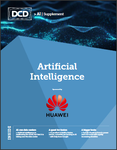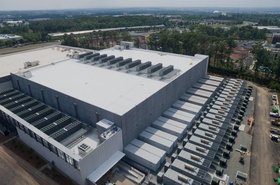Huawei has announced plans for an Intelligent Data Center Service which will help design, build and operate efficient facilities, which use artificial intelligence (AI) to reduce power usage effectiveness (PUE) by up to 15 percent.
The full-lifecycle, one-stop shop service includes consulting & design, integration implementation, intelligent operation and maintenance (O&M), and operation support. It was announced at the Industrial Digital Transformation Conference, a digital-only event held by the company in the wake of the cancelation of MWC 2020, the first of a slew of tech industry events to be postponed or canceled in response to the worldwide covid-19 coronavirus outbreak.
Interest in smart buildings also emerged elsewhere, as Schneider Electric bought German construction software firm RIB for €1.4 billion ($1.5bn).
Efficiency needed
"Large data centers will be both the focus and the challenge of the future," said Hank Stokbroekx, vice president of enterprise service, Huawei Enterprise during the webcast. "A super-large data center must have five features: resource convergence, high power efficiency, business continuity, technological innovation, and intelligence."
The service is both green and intelligent, said Stokbroekx. It uses modular data centers to reduce the physical space occupied, and includes built-in energy-saving AI algorithms which can reduce the PUE to 1.2.
Intelligent: 3D modeling and the Control Flow Diagram (CFD) software help to simulate the data center construction. Smart IDC quickly collects system information and generates reports in one click, providing accurate input for planning and design. I·Migrator provides one-stop solution generation and technical management services, greatly reducing data center operation risks.
The Huawei service starts with consultants, who review the customer's business strategy to determine the right strategic data center investments, using planning standards such as TOGAF and ADM. It then uses cloud based design tools such as I·Designer, to pre-test and pre-verify any proposed data center constructions, and allocate construction resources. Huawei claims this can cut the onsite construction period by as much as 50 percent.
In the operation phase, Huawei promises an intelligent O&M service which can increase efficiency by 20 percent, through continuous monitoring and AI fault prediction. It is based on ideas pioneered in the company's own cloud data centers at Dongguan and Ulanqab in China Huawei is also offering an operation support service, which includes monitoring, prediction, warning, coordination, decision-making, and command.
Schneider buys RIB
Meanwhile, French electrical equipment group Schneider Electric is looking for more expertise in smart buildings with its purchase of German construction software firm RIB Software for €1.4 billion ($1.5bn). “Schneider Electric believes that the buildings of the future will be All-Digital and All-Electric,” said Schneider Electric Chairman and CEO Jean-Pascal Tricoire, adding that 40 percent of world carbon emissions come from buildings.
The statement said Schneider plans to use digital technologies to make construction more efficient, and buildings more green.




